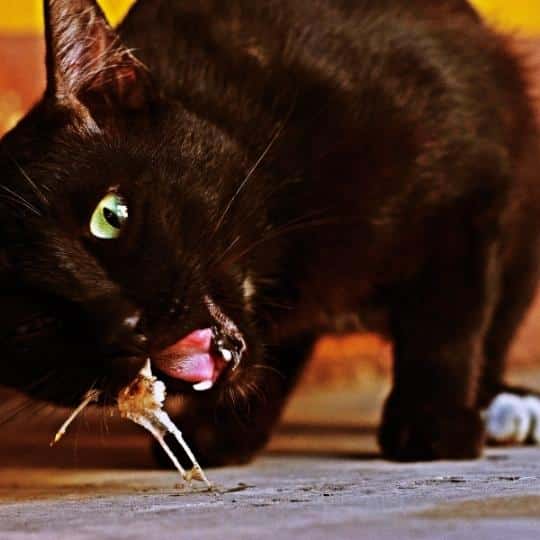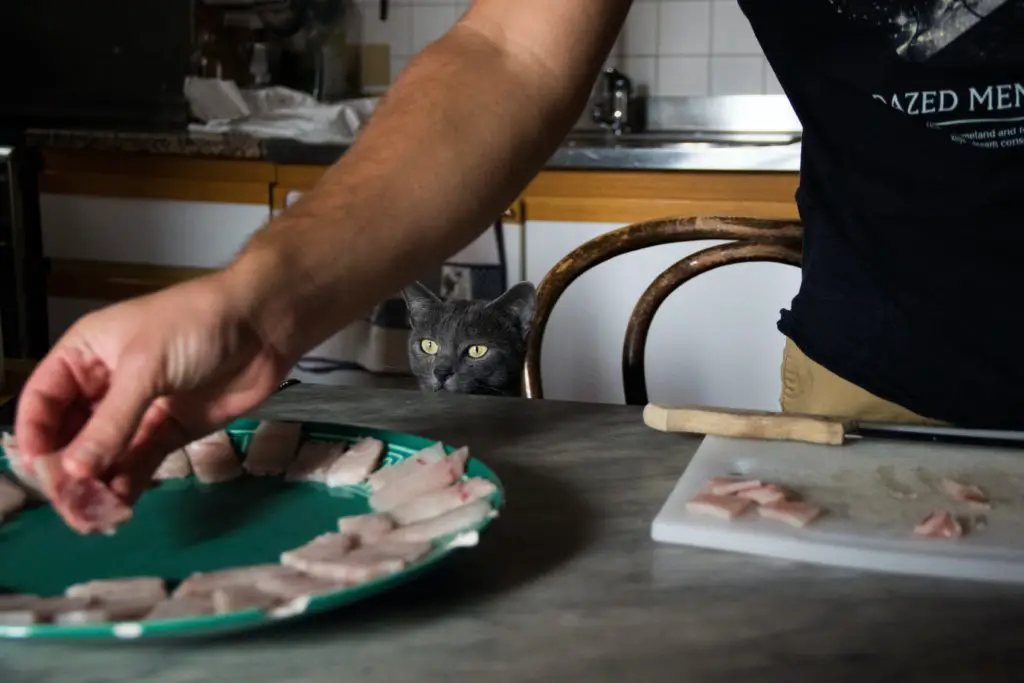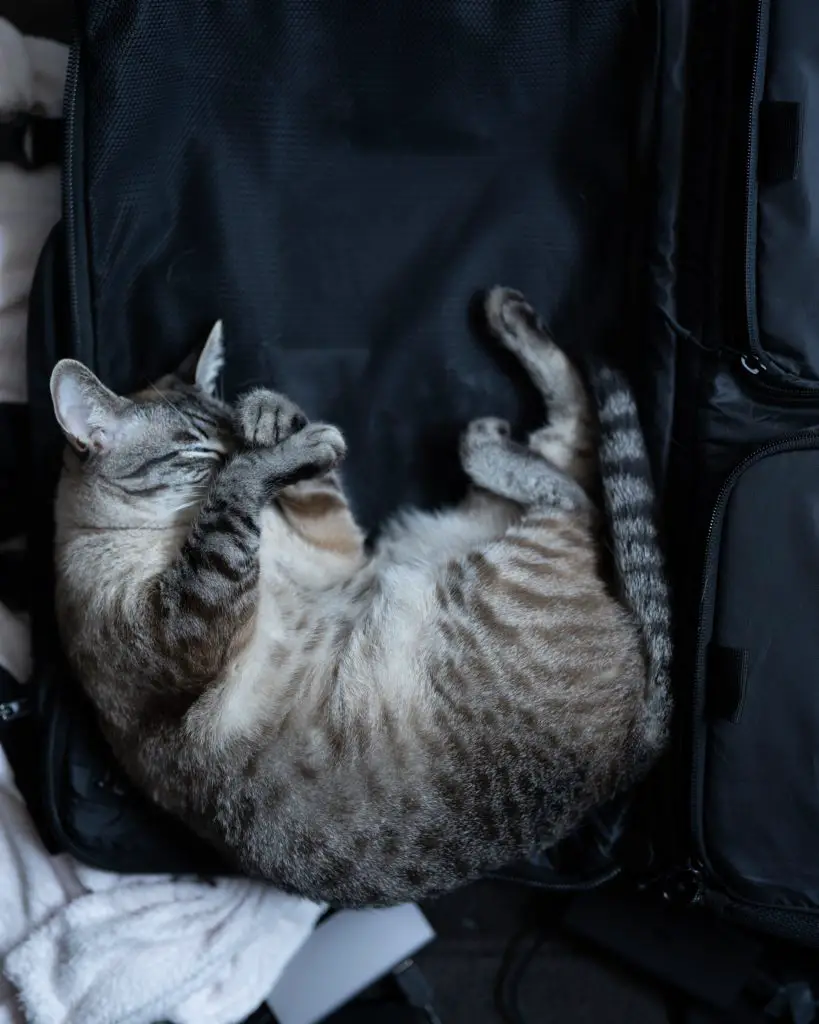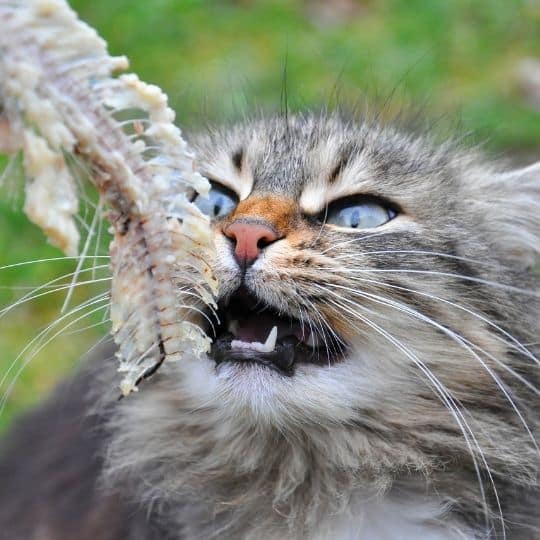We are all familiar with the stereotypical image of a cat hunting a fish or holding a fishbone. Have you ever wondered how true this is? When it comes to fish bones in your cat’s food – how dangerous is it? How often can you feed fish to your cat? And most importantly – Can Cats Eat Fish With Bones?
Can Cats Eat Fish With Bones – Short Answer

It is generally advised that one should avoid giving fish bones to cats entirely. This is primarily because eating bones can cause several bad outcomes for cats.
They include cats choking on a bone or other damages to their digestive system. Truth be told – wild cats often hunt for fish and therefore eat the raw fish bones.
However, domesticated cats are not as accustomed to digesting the fish bones the right way. Most of them are fed cooked food on a regular basis, so they lack the ability to digest raw bones properly.
So, if you want to be sure of avoiding a visit to your vet – don’t feed fish bones to your cat. This includes cooked and uncooked fish bones, as both can be a choking hazard.
Exceptions With Feeding Cats Fish With Bones
Now – this doesn’t mean that you should completely avoid feeding fish to your cat.
Fish contains fatty acids such as omega-3 and omega-6 which are beneficial to the health of your little friend. These fats will ensure the shiny coat and healthy skin of your cat.
When it comes to bones, it is common knowledge that calcium in them can improve your pet’s bone development. However, boned fish contains very few nutrients as opposed to many health hazards associated with it.
This is why avoiding feeding fish bones to your cat overall is the safest option.
If, however, you decide to feed your cats fish bones, please note that cooked bones are riskier than uncooked ones.
Wondering how to feed fish to your cat safely?

When you want to ensure your cat has proper nutrients in your diet, the keyword is moderation.
Each time you decide to serve your cat some fish, make sure to serve it raw. Cats can chew, digest, and even regurgitate raw bones more easily. [1]
Start with smaller fish and make sure you monitor their meal and their behavior afterward. This is crucial as there is always a risk associated with eating bones, no matter how small.
Secondly, if you feed them cooked fish – remove the bones! Cooked bones become brittle and are more likely to shatter and get stuck in the cat’s throat or digestive system.
Cats can eat fish but in moderation. It’s best to feed them fish occasionally, as a snack, and it’s best to remove the bones altogether.
Is Fish Wet Food Bad For Cats?

Now you know a thing or two about why boned fish might be dangerous for your cat. This is why you may wonder – Is fish wet food bad for cats?
Fish is usually regarded as common cat food. Contrary to this common belief, you should not feed cats with fish every day.
There are many risks associated with cats eating fish. Research shows that fish is actually not a proper protein source for cats, and it can even be their common allergen!
It’s true that fish has a strong scent and good taste that typically draws cats in. This is why plenty of canned cat foods do contain fish or have a fishy smell.
As of now, there is no evidence that shows risks with cats eating canned food with fish.
However, as a cat owner, you should be well aware of the fact that cats quickly get familiar with certain scents and flavors. They can also develop a preference for one certain type of meal and reject the other ones.
You should especially avoid feeding fish to kittens as they can get addicted to it.
This outcome is especially bad when we take a look at some of the disadvantages of fish in cat food.
Among others, the most common ones include:
- Urinary Tract Problems
The canned cat food with fish can often include fish bones. Even when it doesn’t, it’s proven that the high magnesium it contains can lead to urinary tract problems in cats.
- Allergy
It may not be common knowledge but fish is an allergen. This means it can, with or without bones, create an allergic reaction in some cats.
- Vitamine B (Thiamine) Deficiency
Cats need food high in Thiamine (Vitamine B) to survive and live well. Fish not only lacks thiamine, but it also contains an enzyme that destroys it. This can create serious neurological problems in cats and/or seizures.
- Metals In Canned Food
Some canned food or cat threats contain tuna fish. This fish, like other predatory ones, are very high in heavy metals, like mercury. This can also be harmful to your cat and even create neurological problems down the line.
We’ve also mentioned that bones (canned or not) are simply not as high in calcium to be considered beneficial to cats. Now you’re also aware of many reasons as to why it’s not good to have them addicted to fish.
Which foods to also avoid giving to your cat?
If you wonder about this, you’ll definitely want to research feeding cats chickpeas, lettuce, lobsters, feta cheese, and even ketchup.
Can Fish Bones Kill a Cat?

Unfortunately, this is quite possible. The fish bones, like the other bones (e.g. chicken bones), can choke your cat.
Not only that, a fish bone may damage your cat’s throat. All of these warnings are a good sign for you to avoid giving bones to your cat. If you do decide to do that, make sure you keep a close eye on your cat for that day. The good news is – there are always symptoms for you to look out for in order to stop this. Some of them include:
- Vomiting
- Lethargy
- Loss of appetite
- Diarrhea
- Swelling of the cat’s tummy
If these symptoms appear sometime after the cat already ate the bone, it’s probably too late to remove it. It’s best to take the cat to the emergency vet clinic as soon as you can!
Choking Cat – What To Do?

If you noticed the cat choking during the eating, it’s probably best to attempt to remove it from the cat’s mouth.
This is why it’s important to supervise your cat’s meal, as it’s crucial to do it right away!
It’s also important because you want to be sure of the cause of the choking. For example, you don’t want to confuse it with a choking on a hairball.
However, it’s always smart to know what to do when your cat is choking.
Hold your cat’s jaw with one hand and try to catch the bone with your other hand’s index finger. Be careful and gentle enough not to push the bone deeper into the cat’s throat!
You can also gently pull her tongue to see what caused the obstruction.
If nothing works – you are left to perform the Heimlich maneuver. Note that it’s highly beneficial to know of this method beforehand, in case this accident occurs in the future.
Bottom Line
Now you know the answer to the question – Can Cats Eat Fish With Bones?
Serving fish in cat’s food, whether canned, cooked, or raw, can cause more problems than nutrient value for cats.
With younger cats, it’s best to avoid fish in their food overall as they can get addicted to it.
If you have an older cat, you may feed it fish once in a while. However, try monitoring their meal and remove any bones from the fish beforehand.
